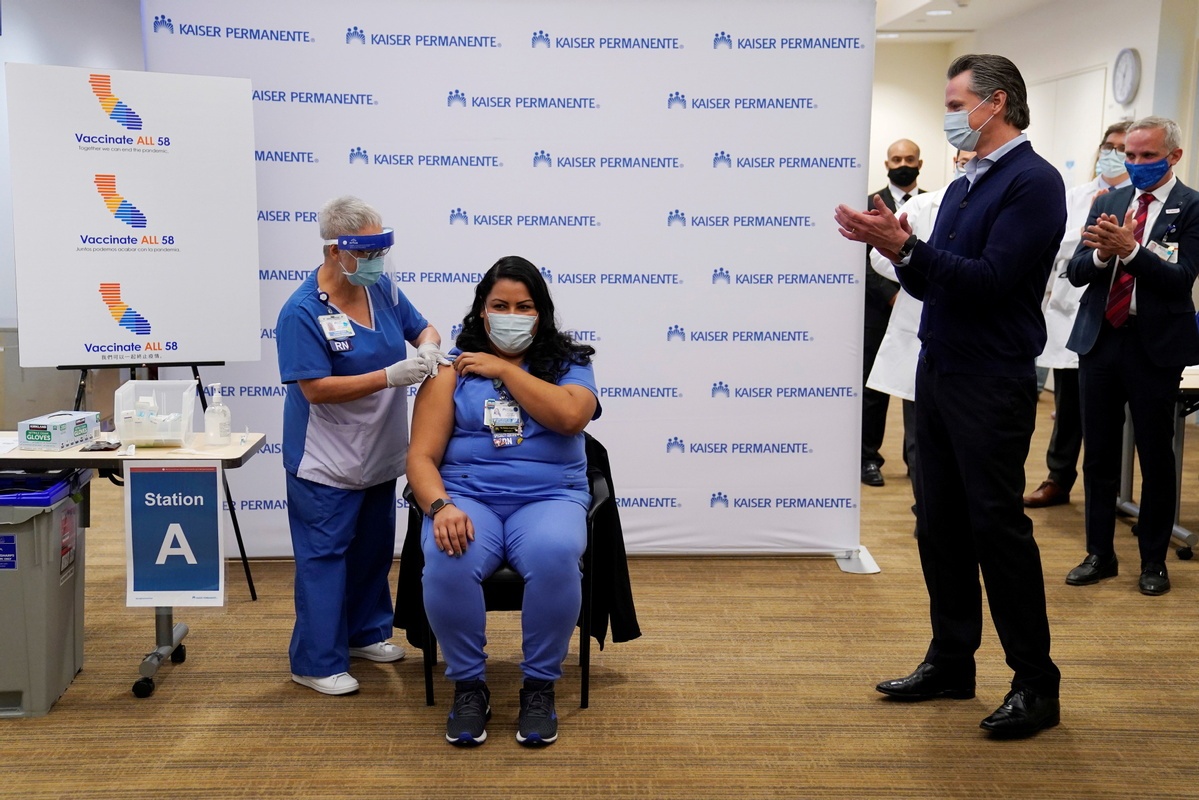
California's Governor Gavin Newsom looks on as ICU nurse Helen Cordova receives the Pfizer-BioNTech COVID-19 vaccine at Kaiser Permanente Los Angeles Medical Center in Los Angeles, California, US on Dec 14, 2020. (Photo: Agencies)
As Americans received the first shots of the Pfizer COVID-19 vaccine Monday, health officials were on the alert for any adverse reactions.
On Monday morning, the first known inoculation since the vaccine was authorized by the Food and Drug Administration (FDA) late last week, was given to Sandra Lindsay, a nurse and the director of patient services in the intensive care unit at Long Island Jewish Medical Center in Queens, a borough of New York City. Lindsay has treated patients throughout the pandemic.
As of Monday afternoon, there were 300,420 deaths from COVID-19 in the US and 16 million confirmed cases of the virus, according to data from John Hopkins University.
Most reactions to the vaccine will be mild and will resolve within one to two days of onset, David Kuhar, a specialist on the Healthcare Infection Control Team of the Center for Disease Control and Prevention (CDC) said Monday during a webinar.
CDC officials said during a webinar with physicians on Saturday that patients with a history of severe reaction should take precautions as there are two documented cases of anaphylaxis in British health-care workers who received the Pfizer/BioNTech vaccine.
Anaphylaxis is a very rare overreaction by the body's immune system. The UK's National Health Service describes it as a severe and potentially life-threatening allergic reaction. Symptoms can be a skin rash, nausea, vomiting, difficulty breathing and shock. Adverse reaction is commonly seen with vaccination.
"That's just your immune system being vigorous and working for you," Dr Paul Offit, a pediatrician and vaccine expert at Children's Hospital of Philadelphia and member of the FDA advisory panel that endorsed the vaccine on Thursday. "In many ways, it's a good thing. But you can't have people surprised by this because it is actually a fairly common problem," he told National Public Radio on Dec 11.
Dr Anthony Fauci, director of the National Institute of Allergy and Infectious Diseases, said Saturday, "I don't think that the allergic reactions are even close to being a show-stopper for the Pfizer vaccine."
He said officials will continue to monitor the safety of the vaccines long after they have received emergency authorization.
"Observation of safety does not end when you start administering vaccines to the general public," he said.
Immunologist Dr Stanley Perlman of the University of Iowa, who also was a member of the advisory panel that voted to recommend the Pfizer-BioNTech vaccine, said he is concerned about potential side effects that may not yet have been identified.
"I worry about something coming up that we don't know anything about. The unknown," he told The Washington Post.
"Our first vaccine safety system is strong and robust," Tom Shimabukuro, the team leader of CDC's Vaccine Safety Team, told clinicians in the Monday webinar.
"No vaccine is 100 percent effective," states CDC-released clinical guidance on Saturday, continuing, "given the current situation and limited information on how well the vaccine works in the general population; how much it may reduce disease or transmission, CDC suggests that people who have received the vaccine should continue following current guidance to wear masks and keep social distance."
According to recent Pew research, only about 60 percent of adults say they would get a vaccine.
The Advertising Council, which has developed important public messages over the years, will be putting out a national campaign to encourage people to be vaccinated.
Michelle Hillman, campaign development officer at the council, said the campaign won't roll out until early next year when the vaccine is more widely available.
"The messenger in this case is going to be even more important in some ways than the actual message itself," Hillman told a Denver affiliate of ABC News, adding that many different spokespeople from doctors and pharmacists to athletes and musicians will be used.
There will also be variations of the vaccine campaign to address specific groups, like communities of color, which have been more severely affected by the virus and tend to have more vaccine hesitancy, he said.


